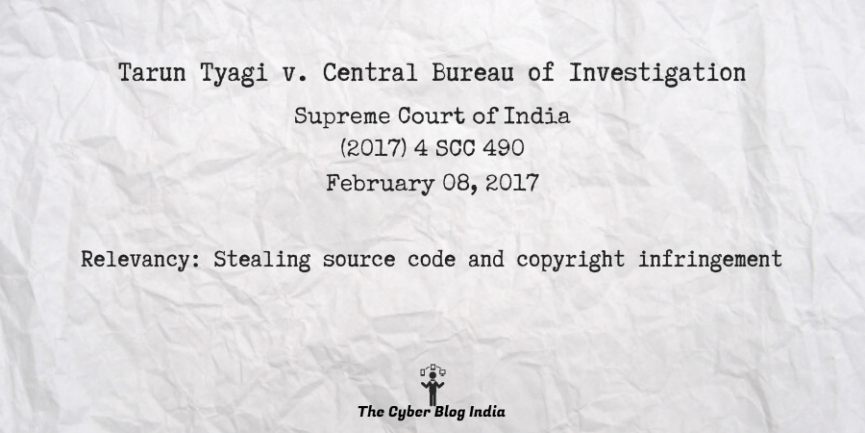Tarun Tyagi v. Central Bureau of Investigation

Tarun Tyagi v. Central Bureau of Investigation
(2017) 4 SCC 490
In the Supreme Court of India
Crl.A. 102/2017
Before Justice Dr. A.K. Sikri and Justice R.K. Agrawal
Decided on February 08, 2017
Relevancy of the case: Stealing source code and copyright infringement
Statutes & Provisions Involved
- The Information Technology Act, 2000 (Section 66)
- The Copyright Act, 1957 (Section 14(b)(ii), 63, 63B)
- The Code of Criminal Procedure, 1973 (Section 165, 207, 173(5))
Relevant Facts of the Case
- The petitioner was an employee of the complainant company i.e. M/s Unistal Systems Pvt. Ltd., a company whose business involves to buy, sell, import-export and distribute all types of computer software and related works. The company had an agreement with the petitioner where the petitioner was entitled to use the products for writing a book on data recovery. For this purpose, the complainant company had financed the petitioner.
- The petitioner was also the Director of M/s Prodata Doctor Private Limited. The businesses that the petitioner’s company had consisted of were consultancy, teaching, data recovery, website promotion, SIM card recovery, investigation, etc.
- An FIR was filed by the CBI on 23rd July 2007 on behalf of Mr Alok Gupta, Director of the company, in which it was suspected that the petitioner had stolen the source code of software known as “Quick Recovery,” developed by the company and was made available for purchase on the website of the company of the petitioner under the name “Prodatadoctor”. The case was filed under Section 66 of the Information Technology Act, 2000 and Sections 63 and 63B r/w Section 14(b)(ii) of the Copyright Act, 1957.
- The CBI had conducted seizures of certain documents from the office/residential premises of the petitioner. It is alleged that the seizures conducted under Section 165 of the Code of Criminal Procedure, were without following the procedure prescribed therein and in the said seizure, the CBI had seized various hard disks and CDs and other materials of the petitioner’s company. The appellant filed an application seeking the release of the seized property, which was rejected and resulted in the filing of an appeal. The company filed a suit for perpetual injunction and damages against the petitioner, alleging infringement of its copyright of software namely Quick Recovery for FAT & NTFS file systems.
Prominent Arguments by the Advocates
Counsels on behalf of the petitioner:
- The submission of learned counsel for the Petitioner is that the business conducted by the Petitioner is affected because of the seizure of all the electronic hardware equipment although incriminating the evidence, if any, maybe only on some of them.
- Learned counsel for the petitioner argued that the petitioner possesses the right to receive the documents in question relied upon by the prosecution, in the absence of which the appellant would not be able to put up his defence effectively. He also submitted that the complainant had filed a suit bearing CS (OS) No. 792 of 2008 against the appellant seeking to restrain him from using/selling the said/similar software or its versions.
Counsels on behalf of the respondent:
- Learned counsel for the respondent has submitted that the application contained the original source code Quick Recovery for FAT and NTFS and as such, the same cannot be supplied to the accused. Learned counsel for the respondent has further submitted that except the three hard discs and one compact disc as mentioned in the application, all other articles and documents have been supplied to the accused/petitioner.
Opinion of the Bench
- In this case, the Court took an undertaking from the appellant that he would not misuse the copy of the cloned CD. The bench is of the opinion that in order to comply with the provision of Section 207 of the Code of Criminal Procedure, 1973, the hard disks marked Q-2, 9 and 20 be supplied to the appellant subject to the following conditions:
- Before supplying the said CDs, the contents thereof shall be recorded in the Court, in the presence of complainant as well as the appellant and both of them shall attest the veracity thereof by putting their signatures so that there is no dispute about these contents later thereby removing the possibility of tampering thereof by the appellant.
- The appellant shall not make use of the source code contained in the said CDs or misuse the same in any manner and give an affidavit of undertaking to this effect in the trial court.
Final Decision
- The appeal stands allowed in the aforesaid terms.
